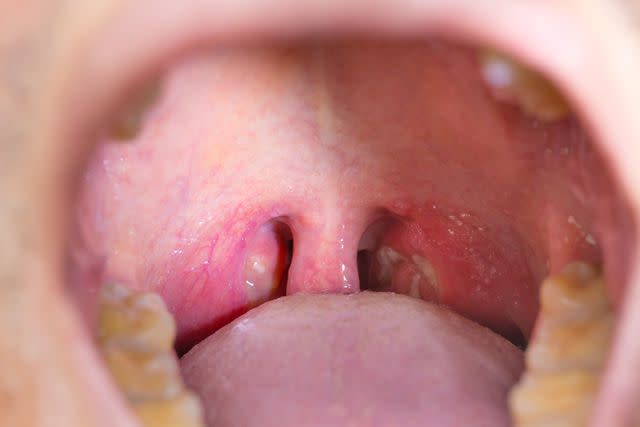Why Are My Tonsils Swollen?
Tonsillitis Causes, Symptoms, and Treatment
Medically reviewed by Benjamin F. Asher, MD
Tonsils are two oval-shaped masses of tissue in the back of the throat, one on each side. As part of the immune system, they help identify and fight infections. A viral or bacterial infection typically causes swollen tonsils. Infected tonsils are called tonsillitis. The terms "swollen tonsils" and "tonsillitis" are often interchangeable.
This article will discuss the symptoms, causes, diagnosis, and treatment of swollen tonsils and outline when to call a healthcare provider.

milorad kravic / Getty Images
Symptoms of Swollen Tonsils
Swollen, infected tonsils can cause symptoms such as:
Sore or scratchy throat (pain may be localized on the sides of the neck)
Pain and/or difficulty with swallowing
Swollen throat
Irritation in the throat
Visible redness of the throat/tonsils
Blisters or small ulcers on tonsils
Hoarse voice or loss of voice
Pain when talking
Difficulty breathing
Grayish-yellow or white coating or spots in the throat/on tonsils
Foul-smelling breath ("bad breath")
Nausea or vomiting
Headache
Fever/chills
Fatigue
Tenderness of the jaw/throat
Sleep problems, including snoring and/or sleep apnea (breathing stops briefly while sleeping)
Swollen lymph nodes (glands) in the neck
Babies and young children with tonsillitis may:
Refuse to eat
Drool excessively (because of difficulty swallowing)
Be unusually fussy or fatigued
Have difficulty breathing
Enlarged vs. Swollen Tonsils
"Swollen" and "enlarged" mean that the tonsils are bigger than they should be. The terms are sometimes interchangeable, but there is a difference in the terminology, specifically:
Swollen tonsils: Inflamed and infected
Enlarged tonsils: Bigger for a reason other than infection

bgton / Getty Images
Causes of Swollen Tonsils
Swollen tonsils usually result from:
Viral infection
Bacterial infection
Tonsillitis caused by viruses is more common in younger children, while cases caused by bacteria are more common in kids and teens ages 5 to 15. Tonsillitis is uncommon in adults.
Viral Infection
Viral infections are the most common cause of swollen tonsils. Viruses that are associated with swollen tonsils include:
Adenoviruses: These viruses cause colds, bronchitis, and other related conditions.
Epstein-Barr virus (EBV): This virus can cause mononucleosis. It can infect the epithelial cells of the tonsils, resulting in swollen tonsils, which can occur as part of mononucleosis.
Herpes simplex virus: This virus causes cold sores on the lips and can also cause blisters on the tonsils, leading to swelling.
Measles: This virus affects the respiratory system and can cause swelling in the throat and airways. Measles has been rare in the United States due to immunization, but millions of cases still occur worldwide. It is extremely contagious in unvaccinated people, and outbreaks can occur in the United States if fewer people are immunized.
Bacterial Infection
Strep throat (caused by the Streptococcus bacterium, often called strep) is the most common bacterial cause of tonsillitis. About 15% to 30% of tonsillitis cases are caused by bacterial infection.
A bacterial dental infection, such as from gum disease or tooth decay, may also lead to swollen tonsils.
Tonsil Cancer
In adults, cancer of the tonsils is a rare cause of swollen tonsils. This can be mistaken for bacterial or viral tonsillitis. It is important to treat this cancer early and aggressively. This type of cancer may be linked to human papillomavirus (HPV) infection.
Types of Tonsillitis
Tonsillitis can be classified as:
Acute: Tonsils are swollen for a few days to two weeks
Recurrent: Swollen tonsils happen several times a year
Chronic: Tonsils that are swollen long-term and don't resolve with regular treatment
How to Treat Swollen Tonsils
Treatment for swollen tonsils depends on the cause of the infection and the severity of the symptoms.
Home Remedies
Swollen tonsils may not require medical treatment. Your healthcare provider may choose a wait-and-watch approach to see if your body clears the infection.
Whether or not you are receiving medical treatment, there are things you can do at home to feel better, such as:
Staying hydrated with cool or warm (not hot), bland liquids, like water, warm tea, broth, or Popsicles
Eating soft foods
Getting plenty of rest
Gargling with warm saltwater
Using a humidifier, especially during sleep
Sucking on throat lozenges (not for children under age 4 because it is a choking hazard)
Avoiding smoking, secondhand smoke, and other irritants
Medication
Antibiotics can treat bacterial infections. If prescribed antibiotics, finish all the medication as directed, even if you feel better. This helps prevent it from returning, spreading to others, or leading to more serious complications, such as rheumatic fever caused by strep, which can damage the heart.
Viral infections are not treated with antibiotics, but antiviral medications may be prescribed in some cases.
Medications such as Tylenol (acetaminophen) or Advil or Motrin (ibuprofen) may help to lower fever and ease pain or discomfort from swollen tonsils. Never give an infant, child, or teenager aspirin because it may cause a rare but serious condition called Reye's syndrome.
Surgery
Surgery to remove the tonsils (called a tonsillectomy) is a last-resort treatment for swollen tonsils. It may be recommended if any of these guidelines are met:
Seven or more episodes in the past year
Five or more episodes in each of the past two years
Three or more episodes in each of the past three years
Surgery may also be considered in special circumstances such as:
Symptoms aren't responding to other treatments.
There are complications such as breathing difficulties or sleep apnea.
The surgery usually takes about 20–30 minutes. It is typically an outpatient procedure, but very young children or people who experience complications may stay overnight at the hospital.
The surgery is performed through the open mouth. The surgeon performs the procedure with a special tool that uses sound waves or heat to remove the tonsils and stop any bleeding.
Is Tonsillitis Contagious?
Tonsillitis is not contagious, but viruses or bacteria that cause it are contagious. To stop spreading germs, people with tonsillitis should avoid others and wash their hands frequently.
Complications Associated With Swollen Tonsils
Tonsillitis usually clears up on its own or with treatment, but in some cases, complications can arise. These include:
Chronic tonsillitis: Repeated or persistent episodes of infection that don't respond to treatments such as antibiotics
Peritonsillar abscess: Bacteria from the infected tonsil that spreads to the surrounding tissue causing pus to collect and require draining (if not hospitalization or surgery)
Tonsillitis and adenoiditis: Infection in the tonsils and adenoids that can cause serious complications if untreated
If the tonsillitis is caused by strep throat, it must be treated to avoid rare but serious complications from strep bacteria.
Are There Tests to Diagnose the Cause of Swollen Tonsils?
To determine the cause of swollen tonsils, a healthcare professional will:
Discuss symptoms and medical history
Perform a physical examination, checking the ears, neck, mouth, and throat
Perform a throat culture to see if a virus or bacteria is causing the infection
Perform other diagnostic tests if necessary, including an endoscopy (a long, flexible tube with a light used to examine the adenoids), an X-ray, blood tests, or a sleep study
If strep throat is suspected, the healthcare provider may use an in-office rapid strep test, which shows results within minutes. The sample may also be sent to a lab for a throat culture if the rapid strep test is negative or as a way to confirm the results of the rapid test. The results of a lab test can take a few days.
When to See a Healthcare Provider
Get emergency care right away if there is:
Trouble breathing
Trouble swallowing
Drooling (which can indicate trouble swallowing in young children)
Contact your healthcare provider if:
Symptoms such as sore throat last for more than a few days.
Symptoms are severe, or you are in great discomfort.
You have a fever of 101 degrees F (38.3 degrees C) or higher.
You're experiencing extreme illness, fatigue, or weakness.
There is pus in the back of the throat.
A red rash appears that feels rough and causes increased redness in the skinfolds.
Lymph nodes in the neck are tender or swollen.
One tonsil is larger than the other.
You are an adult and have tonsil swelling that doesn't go away and/or without other symptoms (which could be an indication of cancer).
Summary
The term "swollen tonsils" typically refers to an infection of the tonsils called tonsillitis. Tonsillitis is usually caused by a virus but can also result from a bacterial infection (usually strep throat).
Tonsillitis can cause symptoms such as a sore throat, fever, bad breath, yellow or white patches in the throat, pain or difficulty with swallowing, and/or sleep problems.
Swollen tonsils can heal independently, or they may need treatment such as medication or surgery.
Read the original article on Verywell Health.

